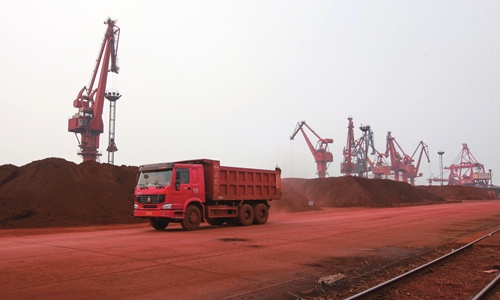China has established what experts are calling an "aircraft carrier" in China's rare-earth industry by merging rare-earth assets from several state-owned enterprises, as the country moves to bolster its presence in the global strategic metals supply chain, coming at a time when China is looking to protect its resources after years of unregulated exploitation and heightened China-US trade tensions.

A rare-earth mining operation in Baotou, North China’s Inner Mongolia Autonomous Region. (Photo: cnsphoto)
The forming of rare-earth company may drive up rare-earth prices as well as enhance the concentration of the domestic rare-earth industry, experts and industry insiders told the Global Times.
According to a stock filing published by the China Minmetals Rare Earth Co on Wednesday, the company has received notice from its parent company China Minmetals Corp that the State-owned Assets Supervision and Administration Commission (SASAC) has approved to set up a new company based on the strategic merger of assets from companies including China Minmetals Corp, the Aluminum Corporation of China as well as the government of Ganzhou. The new company will be controlled by the SASAC, the country’s state assets watchdog.
Following widespread discussions on the merger, the plan began to take shape in early December, a manager of a state-owned rare-earth enterprise based in Ganzhou, in Jiangxi Province, who spoke on condition of anonymity, told the Global Times.
"The move partly aims to cement China’s edge across the rare-earth upstream and downstream sectors. It is expected that the new company will enforce stricter rules relating to production quantity as well as the export volume of rare earths, which may also drive up the rare-earth price," the manager said.
Another Ganzhou-based industry insider told the Global Times that “this is not a secret within the industry."
According to the US Geological Survey, China accounted for 58 percent of rare-earth production worldwide in 2020, down from around 90 percent some four years ago as the US and Australia gradually boost production.
However, China's rare-earth industry also faces challenges, such as environmental protection concerns affecting the lives of local residents and an inefficient use of the valuable resource due to enterprises' price competition over the years in effort to maximize profits.
Xiao Yaqing, the head of the Ministry of Industry and Information Technology (MIIT), said in March that "China's rare earths aren't being sold at a 'rare' price but at an 'earth' price."
Chen Zhanheng, deputy head of the China Rare Earth Industry Association, told the Global Times recently that the restructuring reflects growing government focus on the healthy development of the rare-earth industry, which will help address persistent environmental problems while enhancing market concentration.
Wu Chenhui, an independent industrial analyst, said that the new rare-earth group would be an "aircraft carrier" within the industry, and would lead the government to implement better management practices specifically when it came to procurement of raw materials, manufacturing control and technological innovation.
"After forming the company, China's rare-earth industry will shift from a scattered, small-scale status toward a systematic, comprehensive model," he told the Global Times.
Wu also stressed that after the new company was set up, China’s role in guaranteeing the global rare-earth supplies will not change, but chances are China would also adjust the structure of the minerals' exports given its special nature as strategic materials.
Rare earths are a group of 17 chemical elements used in everything from high-tech consumer electronics to military equipment. China is widely acknowledged as leading the world's rare-earth sector in terms of production and refining technologies.


